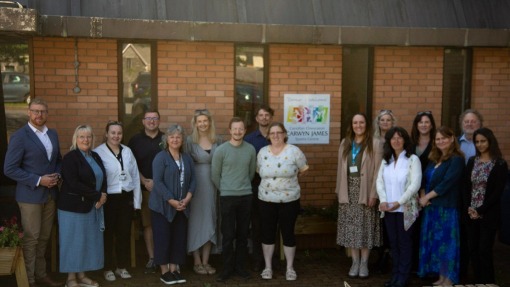Over the past few months staff at the University of Wales Trinity Saint David’s Carmarthen Business School have been engaged in a shared prosperity rural innovation fund project in rural Carmarthenshire: ‘Identifying the Challenges for Enhancing Rural Resilience through the Circular Economy (CE)’ which aims to address the need for a move towards a Green economy by increasing business resilience and sustainability in rural areas.
Carmarthen Business School recently hosted the first of a number of training and dissemination events that are aimed at raising awareness of the project in Carmarthenshire and engaging with rural enterprises in sharing the current findings from the project.
The event, held at Canolfan Carwyn in Drefach included local enterprises presenting their circular economy practices as well as explaining the barriers they are facing that slows their engagement in the circular economy, including finance and business support needs. The Rural Carmarthenshire Circular Economy Learning event was designed to continue their engaging with enterprises in learning about the challenges and barriers impeding a transition to circular economy.
Cllr Aled Vaughan Owen, Cabinet Member for Climate Change, Decarbonisation and Sustainability at Carmarthenshire County Council opened the event. It featured a range of speakers from the public, private and voluntary sector involved in the Circular Economy in Carmarthenshire. The event included a tour of the Gwendraeth Valley Men’s Shed and speakers including CWM Environmental, Carmarthenshire County Council, Reith Honey, Slowly, Canolfan Carwyn and CEIC. There was good opportunity for networking and discussion as well as a training activity to capture information about the enterprise’s current needs and future aspirations as they plan more engagement in circular economy activities.
Diane Thomas, Waste Strategy and Policy for Carmarthenshire County Council said:
“Carmarthenshire County Council have embraced the principles of the Circular Economy maximising on sustainable waste solutions by reusing, repurposing, and recycling as much as we can. Our residents and communities are helping us on this journey along with our partner Cwm Environmental Ltd who operate the Eto Reuse village in Nantycaws. In a world of depleting natural resources, climate change, biodiversity loss and high costs of raw materials it makes total sense to transform a throwaway economy to one where waste and pollution is eliminated, and existing resources are re-circulated as much as possible.
“Collaborating with UWTSD in a local event that showcases the circular potential in Carmarthenshire was an important opportunity to develop links with businesses and the education sector and to highlight our circular economy projects.”
Dan Taylor-Peter from CWM Environmental added:
“CWM was delighted to be invited to speak at Rural Carmarthenshire’s Circular Economy event in Drefach. We discussed our journey in site biodiversity and our flourishing reuse village in Nantycaws—Canolfan Eto.
“It’s been encouraging to see local small and medium businesses and organisations make conscious decisions on their operations and put the environment first in many of their choices.
“Events like this are essential for growing and developing the circular economy in Carmarthenshire.”
Dr Roisin Mullins from UWTSD leads the shared prosperity rural innovation fund project in rural Carmarthenshire and she explained that:
“The importance of Carmarthen Business School’s role in engaging with rural enterprises as we have the potential for driving changes through education and training that helps identify and develop collaborative solutions, enable businesses, stakeholders, and communities to move forward together.
“As part of enterprise resilience, the circular economy presents a new way of working and this means changing existing processes and adapting to changing production and consumption practices and reducing waste. The business school can support this change through research and training with the focus on how circular economy can present an opportunity to explore practices which involves sharing, leasing, reusing, repairing, refurbishing, and recycling existing products and materials to keep them in use for as long as possible. All enterprises can benefit from the opportunities through engaging in circular economy locally as well as internationally.”
For further information please contact cbs@uwtsd.ac.uk
